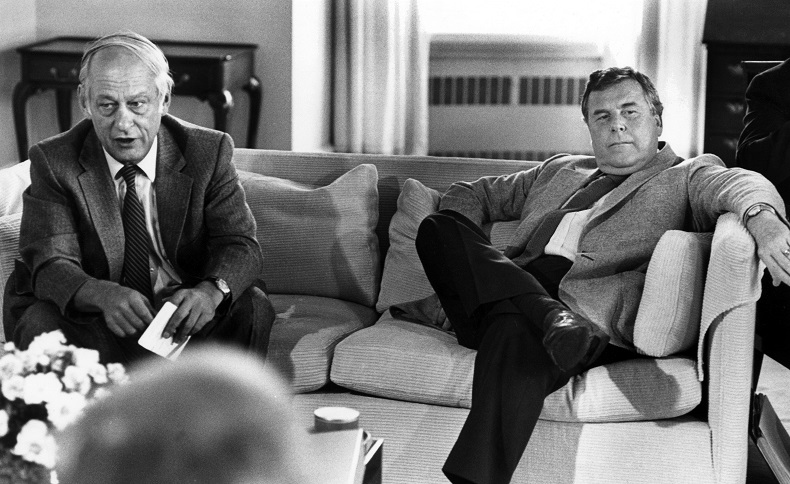Suddenly, Canada’s Constitution is a hot topic in Ottawa. It’s a 35-year-old document that has had a nip here and a tuck there, but that’s about it. So what’s the deal?

To some, the Constitution is the essence of the country – it’s the heart of the nation’s democracy and who Canadians are at their core.
To Quebecers, however, the 35-year-old Constitution and Charter of Rights and Freedoms are problematic.
What was Quebec’s holdup?
Quebec has never been a part of the Constitution, though it was initially in favour, explained Daniel Salée, a professor at Concordia University’s School of Community and Public Affairs.
“He was on board,” Salée said of then-Quebec premier René Lévesque. “The negotiating process was going pretty well.”
READ MORE: Canada’s Charter remains a flawed document that no politician dares try to fix
But then, in what’s come to be known as the Night of the Long Knives, one of the Constitution’s architects and negotiators, Jean Chrétien, who was justice minister at the time, cut a deal after Lévesque had left the table for the night.
That deal appeased all other provinces, whose leaders had been leery of the Charter taking too much power away from the provinces and handing it to Ottawa.
FROM THE ARCHIVES: Chretien on the 30th anniversary of the Constitution
It was only when Lévesque rejoined the group the next morning that he learned of the deal. And that was when then-prime minister Pierre Trudeau and Chrétien lost Quebec’s support.
And so, since 1982, Quebec has not been part of the nation’s Constitution.
What does Quebec want now?
Quebec Premier Philippe Couillard has spent a few years working on his approach to this bid to reopen the Constitution, which is laid out in a 200-page document.
The document reiterates five familiar demands that many Quebec governments have sought since the mid-1980s.

Those include:

Get breaking National news
- Recognition of Quebec as a distinct society
- Limits on federal spending power
- Guaranteed Quebec representation on the Supreme Court of Canada
- The power to veto constitutional amendments
- More control over immigration
What distinguishes Couillard’s proposal from past ones, he said, is the approach he wants to take to negotiations.
OK, but why now?
Upon becoming leader of the Quebec Liberals in 2013, Couillard vowed to reopen constitutional talks. Until now, he hadn’t touched the issue and the province is scheduled to hold an election in a little more than a year.
Still, this sudden move has even the pros scratching their heads.
“It is surprising,” Salée said of Couillard’s timing. “He’s never been one who makes a big slash about the Constitution.”
That said, the matter of involving Quebec in the Constitution is an issue that’s almost always at the back of any Quebec Liberal government’s mind, Salée said in an interview.
READ MORE: Quebec plans to reopen constitutional debate, launch coast to coast discussion
Forced to guess, the professor said he might pin the timing of the news on the recent, months-long health-care accord negotiations between Ottawa and the provinces.
Several provinces, Quebec included, butted heads with Ottawa before eventually striking deals.
“Those negotiations, here in Quebec, were pretty arduous. Some felt we are being screwed again,” Salée said.
WATCH: Three would be Canadian citizens say the obligation to swear allegiance to the Queen violates their constitutional rights
Michael Behiels, a professor of Canadian political and constitutional history at the University of Ottawa, was at a complete loss.
“I’m puzzled,” he said. “There’s no internal pressure from Quebecers. People have moved on and they’ve got more important fish to fry.”
Behiels suggested Couillard focus on celebrating the achievements the country has achieved in its 150 years rather than trying to launch a divisive debate.
“To open this Pandora’s box is just foolhardy,” he said.
Have there been prior attempts to get Quebec in?
There have been two attempts, both unsuccessful, to include Quebec in the Constitution. Both efforts were included in what some hoped would be major overhauls.
In the late 1980s and early 90s, the Meech Lake Accord proposed granting Quebec its “distinct status” among other amendments, but ultimately failed when the Manitoba and Newfoundland and Labrador governments didn’t support them.
The second attempt at a major overhaul, known as the Charlottetown Accord, also included the “distinct society” demand, but was ultimately defeated in a national referendum in October 1992.
READ MORE: Premier Philippe Couillard wants Quebec to sign Constitution
And so, in 2002, on the 20th anniversary of the patriation of the Constitution, Quebec’s premier presented a motion in the provincial legislature to recognize the fact the province never signed on to the Constitution or Charter.
Premier Bernard Landry went as far as saying the act “is still unacceptable for Quebec,” and his motion passed unanimously.
How hard is it to change the Constitution?
The Constitution has experienced a few changes in its 35 years, although those amendments were mostly limited, affecting only specific provinces (think creating secular school boards or officially designating New Brunswick bilingual).
Any general, broad amendments have to pass the House of Commons and Senate, as well as two-thirds of provincial legislatures representing at least half of the country’s population. Some amendments even require unanimous consent across all federal and provincial legislatures.
What difference has Quebec’s exclusion from the Constitution made?
This is, of course, a hypothetical question with so many moving parts, it’s difficult to answer. Still, practically speaking, both experts Global News interviewed said there’s likely little difference between where Canada is now and where the country might be had Quebec offered its support to the Constitution in 1982.
Behiels speculated that perhaps the 1995 Quebec referendum would have been avoided, but nothing much otherwise.
Why is that? Mostly because — despite its opposition — Quebec has operated and governed within the boundaries of the Constitution, with its courts even invoking the Charter, Salée said.
With files from The Canadian Press









Comments
Want to discuss? Please read our Commenting Policy first.